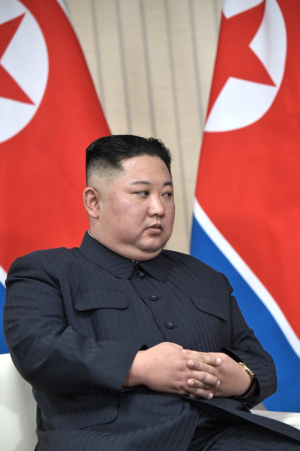In a speech to the plenary session of the Workers’ Party of Korea, Chairman Kim Jong Un said that under present conditions he no longer feels bound to uphold the moratorium on nuclear and long-range missile tests. While North Korea observers debate whether the speech signals an end to negotiations or an invitation to talk, one glaring omission from the speech to note is that Kim made no mention of the Korean War.
Kim’s message to the United States was ambiguous. On one hand, he said that North Korea will punish the United States with “shocking actual action” in response to U.S. sanctions and threatened that North Korea would unveil a “new strategic weapon… in the near future.” These remarks suggest a summary termination of negotiations. On the other hand, he noted that a unilateral moratorium did not make sense “under such condition [sic]” — meaning that there are other conditions (or actions the United States could take) that presumably would bring North Korea back to the bargaining table. According to observers, however, fulfilling these conditions would require that the United States cease military exercises with South Korea, stop the sale of F-35s to the South, and reduce sanctions.
To be sure, this may not be Kim’s final word on the matter. He had been expected to deliver a televised New Year’s speech on January 1, which perhaps has been postponed or more likely was replaced by the plenary session speech.
What does the Korean War have to do with Kim’s present policy? In Pyongyang’s view, on June 25, 1950, U.S.-led forces invaded North Korea, unleashing a country-wide aerial bombing campaign that inflicted massive civilian casualties and devastated the North’s industrial economy before Kim Il Sung brilliantly repelled the U.S.-led coalition back to the 38th parallel. That narrative of the war, while rejected by a majority of the world, persists in North Korea. And this narrative frequently shows up in North Korean publications to advance the state’s policy objectives. When North Korean leaders interpret an event, they often do so in relation to their nation’s history, including the Korean War. Thus, how often and when they refer to the Korean War could reveal something of the intent behind their message, especially when official statements are unclear.
Surprisingly, Kim Jong Un makes frequent reference to the Korean War. One might surmise that Kim would not be a regular purveyor of Korean War history. He was born two generations following the war, educated in Switzerland with access to the countervailing historical account, and did not have an enduring role in shaping the mythology of his grandfather’s achievements in the war, as his father Kim Jong Il did. Yet a comparison of the rates of reference to the Korean War by the Korean Central News Agency shows that such references are 1.8 times more common during Kim Jong Un’s administration than Kim Jong Il’s — spiking in 2013 during an intense period of confrontation with the United States before declining since. Similarly, in his New Year’s speeches Kim Jong Un has made more references to the war in a shorter period of time than his father (seven references in five years compared to four references in a 14-year span).
In this year’s speech at the plenary session, Kim did not mention the Korean War. Neither was there any mention in 2019, as Kim and Trump were leading up to the February Hanoi summit. In 2018, however, following Trump’s “fire and fury” remarks, North Korea’s testing of an intercontinental weapon, and a UN Security Council resolution imposing fresh sanctions on North Korea, Kim made two such references in his January speech. Based on these trends, it seems that Kim’s reference to the Korean War generally aligns with an antagonistic stance toward the United States. When North Korea wishes to rile up anti-American sentiment, it cites America’s supposed invasion and subsequent occupation on the southern half of the Korean Peninsula. When North Korea sues for diplomacy, all references to the war disappear. Thus, omitting the Korean War in his plenary speech suggests that Kim is not seeking a fundamentally antagonistic relationship with the United States at the present time, though there are still appreciable differences between both sides.
To be sure, it is well documented that Kim, like North Korea’s previous leaders, has used history as a propaganda tool. But this reinforces my point. When functioning as an instrument of policy, history — or rather the use of it in official speeches — serves as a guide to understanding how North Korean leaders choose to portray their thinking on an issue. Thus, the Korean War is a common but perhaps underappreciated reference point that can help Korea watchers and policymakers better discern the intent of the Kim family.
The final page in the Trump-Kim saga has yet to be written, and Kim likely will further develop his position in the new year. But in a highly publicized speech intended for domestic consumption and expected to be scrutinized by the world, Kim passed on painting the United States as a war-mongering nation eager for a second Korean War. And in doing so, he may be hedging his bets, leaving open the window for negotiation.
Daniel Aum is Senior Director for Public Affairs and Director of the Washington, D.C. Office for the National Bureau of Asian Research (NBR).

































